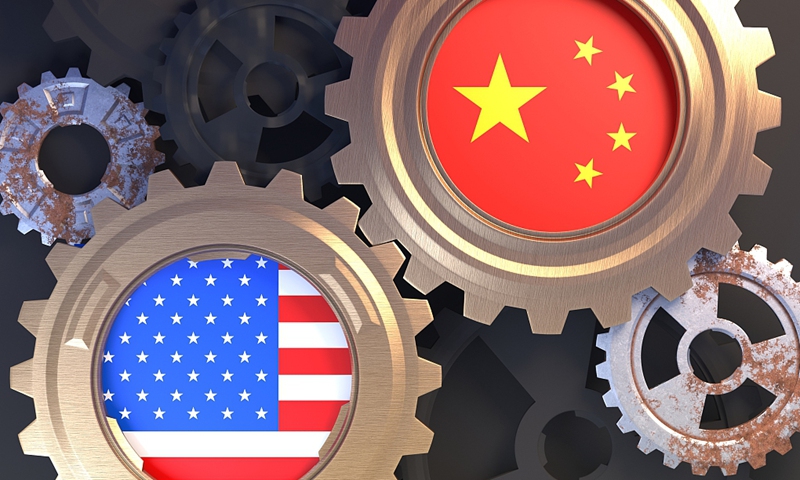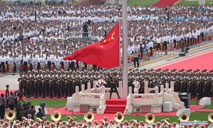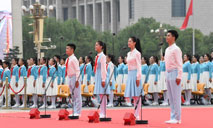US expression on China 'still vague,' Washington needs to prove credibility

China-US
China and the US sent new signals to each other recently as a senior official in the Biden administration on foreign affairs said he believes China and the US can co-exist peacefully and the bilateral ties should not be viewed as a "new cold war," while the Chinese Foreign Ministry on Wednesday responded that China hopes the US would meet China halfway, and take a rational and pragmatic policy on China.
Chinese experts noted that the Biden administration is still being very vague on its China policy and its words and actions contradict each other in many cases and it refuses to correct the mistakes made by the Trump administration, and even makes worse moves to further damage the ties in some fields. So it's impossible for China to have more engagements on higher levels with the US when Washington shows no credible sincerity.
"Do I believe that China and the United States can co-exist peacefully? Yes, I do," Kurt Campbell, White House coordinator for the Indo-Pacific, said Tuesday, according to a press release of his comments at an Asia Society event.
In response to his remarks, Chinese Foreign Ministry spokesperson Wang Wenbin said at Wednesday's routine press conference that "China has always made efforts to build non-conflict, non-confrontation, mutual respect and win-win cooperation ties with the US, but will also firmly safeguard national sovereignty, security and development interests" and China hopes the US would do the same as what China has done.
Chinese analysts said the latest words from Campbell are nothing new, and it seems the US still wants to dominate the bilateral ties as it could cooperate, compete or confront with China whenever they want, just as what US Secretary of State Antony Blinken said many times, which won't work at all.
Among all those vague expressions from US officials, "we can at least learn that the US wants to make the bilateral ties totally serve the US' needs. To be honest, this kind of thinking is too wishful, and it brings no clear direction for China-US relations," said Diao Daming, an expert on US studies at the Renmin University of China in Beijing.
Although he believes a peaceful co-existence is possible, Campbell also said that "I do think this challenge is going to be enormously difficult for this generation and the next" and "There will be periods of uncertainty - perhaps even periods of occasional raised tensions," CNBC reported.
"We have a similar but more precise prediction - the US will eventually learn to respect and accept China, which means a peaceful co-existence, but before that we need to have some confrontations, which are unavoidable and difficult but necessary, to make them understand that they have no choice," Jin Canrong, associate dean of the School of International Studies at the Renmin University of China, told the Global Times on Wednesday.
Since Joe Biden took office in January, his administration has maintained the hostile stance against China of the Trump administration. Biden has called China the "most serious competitor" to the US. On the contentious issue of Taiwan, Campbell reiterated the Biden administration does not recognize Taiwan as an independent country, in accordance with the one-China principle.
While responding to Campbell's remarks at the press conference, Wang also suggested the US read and learn the keynote speech of Xi Jinping, general secretary of the CPC Central Committee and Chinese President, to mark the 100th anniversary of the founding of the CPC on July 1.
"US policymakers will be shocked as they can see very unusual reactions from Chinese people amid the speech of the top leader on that day - Chinese people, whether at the square or watching television, cheered and applauded, especially when Xi mentioned 'great wall of steel' and Taiwan question," said Lü Xiang, a research fellow on US studies at the Chinese Academy of Social Sciences in Beijing.
"Any foreign force which bullies, oppresses, or subjugates us…will find themselves on a collision course with a great wall of steel forged by over 1.4 billion Chinese people and get their heads broken and bleeding," Xi said.
Lü said "the Biden administration wants to make it clear that they don't want to be the one who gets their heads broken and bleeding, so they let Campbell at least say something to ease the intense atmosphere."
But actions speak louder than words, as the Chinese people and government still remember what the US did recently to send the wrong signal to encourage Taiwan secessionism and provoke China in June before the CPC's centennial celebration, Lü noted.
In June, the US sent a C-17 military aircraft to fly three senators to the island of Taiwan with the excuse being "vaccine aid visit," and later, China's Ministry of National Defensecondemned the move as "very vicious political provocation" and warned secessionists on the island they would ultimately get burned by tying themselves to foreign forces.
So on one hand, US officials said they don't recognize Taiwan as an "independent country;" on the other hand, they continue to provoke China on the matter by sending senators and officials to the island and keep illegal military connections. This kind of trick can't fool anyone, and US officials should make no mistake and miscalculate China, Lü said.
When Xi said "No one should underestimate the resolve, the will, and the ability of the Chinese people to defend their national sovereignty and territorial integrity," the people have responded with even much louder cheers. This shows that the Taiwan question is the untouchable bottom line in China and to reunify Taiwan with the mainland, whether by force or not, is one of the top demands of the Chinese people, expert said.
Jin said the US always believes the island of Taiwan is a most effective card that can be used to contain China, "but we want to give the US a reminder or well-intentioned warning: The Chinese people have been angered by the US and Taiwan secessionists, and in a modern country like China, if the public opinion or the will of the people desperately wants something, it will definitely affect the policymaking and actions of the country."
"We believe the professionals on China-US relations like Campbell have realized this but those unprofessional politicians like some senators might still have no idea and continue to be arrogant," Jin said, adding that to what extent Campbell's words on "peaceful co-existence" would affect US policymaking and actions remains to be seen.
Lü said, "It seems like there are two different voices struggling for influence in the White House - the one who support vicious competition with China, and the one more reasonable."
Before the US has a clear and confirmed mindset, and shows its sincerity to fix the ties, there is no need for China to push for a high-level engagement or even a summit, experts said.
"Of course we want to resume dialogue, but we need to see whether the US has sincerity or not," Chinese Foreign Minister Wang Yi said on Saturday to the media when asked about "whether the top leaders of China and the US would engage within 2021" after the opening ceremony of the Peace Forum at Tsinghua University.
When asked about "what China should do at the moment," Wang said that "We should continue to take care of our own business. This is the most important."
Jin said that Chinese diplomats might have learned from previous lower-level engagements that the credibility of the Biden administration is still low, "as the US has failed to deliver what it promised and their words and actions contradict each other." So it's natural for China to be cautious in pushing the higher-level or even top-level dialogue with the US.
"When issuing a clear and final policy on China, Biden should understand that making China uncomfortable has nothing to do with solving prioritized problems for Americans. Those uncomfortable Americans will eventually understand this one day, and then those tough acts against China will bring nothing good for the approval rating," Lü said.
Photos
Related Stories
- Chinese progress in striking contrast with American paralysis: former U.S. House speaker
- UNDERSTAND CHINA: Through the Lens of 'Mutually Assured Prosperity'
- China urges U.S. to stop obstructing law enforcement by HKSAR: spokesperson
- Commissioner's office of Chinese foreign ministry in HKSAR urges U.S. side to stop interfering in Hong Kong affairs on pretext of press freedom
- U.S. probe into COVID-19 origins attempts at info war against China: ex-UN expert
Copyright © 2021 People's Daily Online. All Rights Reserved.










